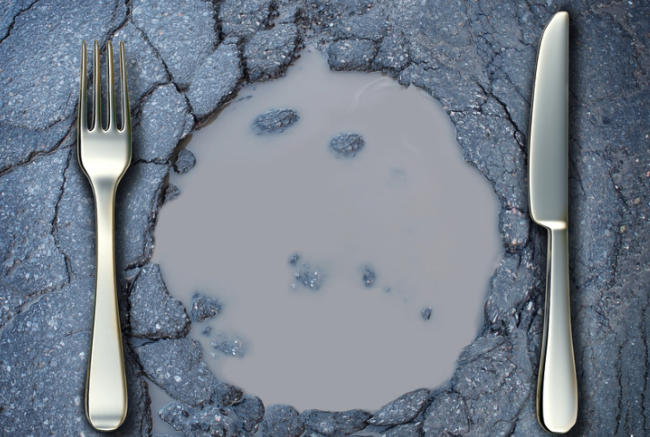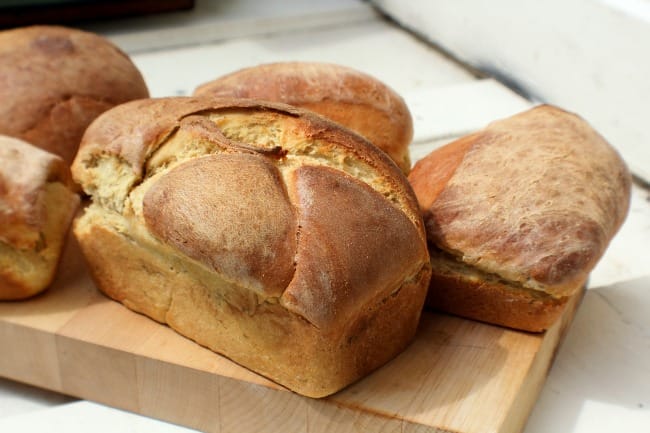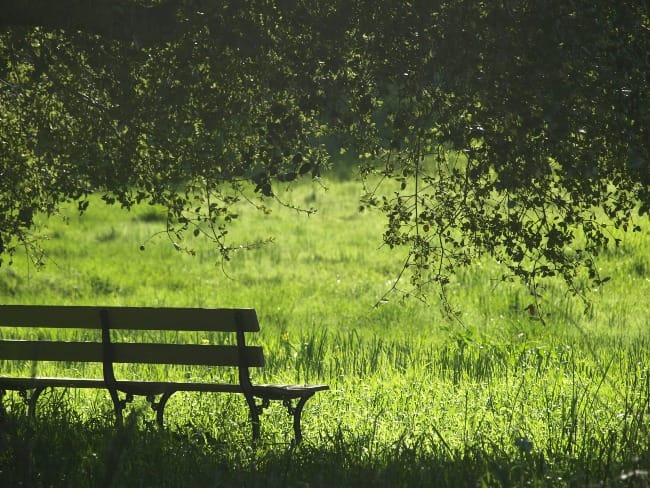Happy New Year! Here is the seventh installment of our Exodus series. If you want to take a minute to read Exodus 16, click HERE. And if you missed the last column in this series, click HERE. Once again, we will walk through the text and highlight aspects that are not typically noticed, and then conclude with a few themes for ecological discipleship. Thoughts and comments are welcome. - James.

Stumbling and Grumbling
After some time at the oasis of Elim, the Israelites set out again. It must have been hard to leave Elim's 12 bountiful springs and head into the wilderness again. Soon they are deep into the Desert of Sin, halfway between Elim and Sinai - the middle of nowhere. The whole community begins to grumble against Moses and Sinai, their mouths echoing the grumbling of their empty stomachs. This moment of suffering prompts a wistful look back at their life in Egypt and a sharp accusation against Moses and Aaron:
“If only we had died by the hand of the Lord in the land of Egypt, when we sat by the pots of meat and ate our fill of bread, for you have brought us out into this wilderness to kill this whole assembly with hunger.”
Suffering during times of transition often paints the past as better than it really was. The Israelites remember meat and bread, but not 430 years of slavery! In this moment, they would prefer servitude with full stomachs rather than freedom with empty ones. Maybe Pharaoh wasn't so bad - at least he didn't lead them out into the desert to die!
One could imagine God responding with exasperation or anger - how could the people lose their faith so quickly? But God does not respond that way, or even wait for Moses and Aaron to ask for help before offering immediate help:
“I am going to rain bread from heaven for you, and each day the people shall go out and gather enough for that day. In that way I will test them, whether they will follow my instruction or not. On the sixth day, when they prepare what they bring in, it will be twice as much as they gather on other days.”
Do they remember how God rained hail down on fertile Egypt and destroyed food crops? Do they see that God will rain down bread in the barren desert and meet the Israelites' daily need? This is framed by God as a test, which I think is about continuing to build a relationship of trust with the people as they get to know each other. Trust is both learned and earned - God establishes a pattern of provision that helps the people learn to trust God but also requires specific actions in response that helps them earn God's trust.
We soon learn that God will provide evening quail in addition to morning bread. If we remember that Exodus is, at heart, a story of new creation, we can see in the evening/morning rhythm an intentional connection to the rhythm of the original creation. We see additional connections to creation in the manna and quail - they are naturally occurring elements of creation that God uses to provide for the people. Old Testament scholar Terence Fretheim notes:
"There is an interest in a detailed description of the manna, which corresponds quite closely to a natural phenomenon in the Sina Peninsula. A type of plant lice punctures the fruit of the tamarisk tree and excretes a substance from this juice, a yellowish-white flake or ball. During the warmth of the day it disintegrates, but it congeals when it is cold. It has a sweet taste. Rich in carbohydrates and sugar, it is still gathered by natives, who bake it into a kind of bread (and call it manna). The food decays quickly and attracts ants. Regarding the quails, migratory birds flying in from Africa or blown in from the Mediterranean are often exhausted enough to be caught by hand. Such gifts of God's good creation are placed at Israel's disposal."
Whatever the precise nature of these "gifts of God's good creation" might be, the people are to gather only enough for each day's needs, except for the sixth day, when they are to gather enough for two days. The seventh day is to be a day of rest - no gathering food, no work. This sabbath day is rooted in the very structure of creation, and in their historical experience - by observing a day of rest each week, the people are emulating God and moving away from the ceaseless production culture of Egypt.
Most of the people do what God commands, though some hoard the manna and quail, or go out to look for it on the seventh day of the week. God remains patient with them - learning a new way of life is a daily discipline that takes time. This will include learning to remember rightly - Moses wisely tells Aaron to keep some manna in a jar in order to preserve the memory of God's daily provision, which will continue for the next 40 years.
This is a story full of lessons for ecological disciples - here are three themes for us to consider.

Remembering Rightly in a Changing World
We are in a time of intense transition that is, and will be, painful. To take just one example, transitioning from fossil fuels to renewable energy sources is not a smooth process. It is pushed forward by technological advances and jerked back by political/economic forces. Wealthy communities/nations will most likely transition faster and smoother than poorer ones. We may hear people say things like:
“If only we had kept our fossil fuel infrastructure, like the good old days when we drove and flew wherever and whenever we wanted..."
It may be easy to forget just how damaging it is to burn coal, gas, and oil around the clock. We need to remember the past rightly, so that we continue to journey towards a better future.

Finding Divine Presence in Daily Provision
The longer I follow Jesus, the more I look for God in my everyday experience rather than in extraordinary miraculous divine interventions. It is not that I am opposed to "burning bush" moments, it is that such moments are exceptional, and if we emphasize them too much we will miss the moments of divine blessing and provision that come with each breath of air and bite of bread we take.
Focusing on everyday experience also reminds us that spiritual and physical provision are intimately interwoven. When Jesus teaches us to pray, "Give us today our daily bread," it is a chance to recognize our complete dependence on the Creator for every aspect of life. This means that hoarding resources can impact our relationship with God by creating an illusion of control and self-provision.
I have found that starting Circlewood, the non-profit behind The Ecological Disciple, has forced me to look to God for daily provision. I have often found myself without the knowledge, experience, or resources to move Circlewood forward - a reality that has made my prayer life very concrete! It has been hard, but it has also energized my faith to see the ways God has come through and provided.

Embracing Sabbath as Gift and Calling
The practice of Sabbath was crucial to Israel's new life with God, and it is for ours as well, especially as an antidote to our current patterns of overconsumption and overwork. The rhythm of Sabbath is a gift and a calling. It provides us with regular times to rest, reconnect, redistribute, and remember. We are invited to rest in order to give ourselves time to recover from our work. We are invited to reconnect with God, one another, our fellow creatures, and the land. We are invited to consider the gifts we have been given, and to think about how we might gift others with any surplus we have been blessed with. We are invited to re-member - to put back together - who we are as divine image-bearing, communal creatures called to partner with God in making the world right.
I think about Sabbath-keeping a lot, mostly because I have such a hard time doing it. I find it difficult to relax, to let go, to enjoy the world as God did on the seventh day of creation. When I do embrace a sabbath mindset, I find myself breathing easier, laughing longer, and more able to put my work in better perspective. I also find that my work typically improves! But Sabbath-keeping is not a means to an end, it is the end, or at least a picture of the end as God intends it to be. When we practice Sabbath-keeping, we bring that future into the present. What a gift!
With you on the Way,
James
Leave a comment below, or email me directly at james.amadon@circlewood.online.
Like what you are reading? Consider a gift to our parent ministry, Circlewood, or join our supporter community, The Circlewood Stand. Just $10/month makes a huge difference, and makes you part of a growing group of people standing FOR the good of creation and standing WITH Circlewood as we make a difference together. Thanks for considering!